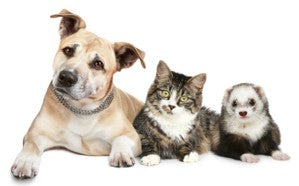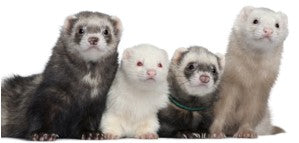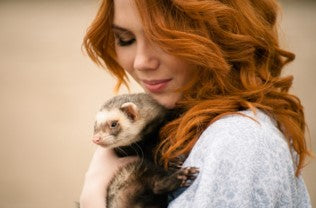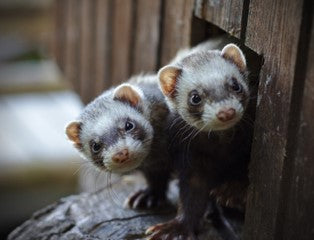
The Top 10 Most Interesting Things About Ferrets
Ferrets are more than just pets; they are bundles of energy with a rich history and fascinating behaviors that can bring joy and amusement to any home. Below are our top 10 most interesting things about ferrets, but of course if you own a ferret, you probably have many more! From their playful nature to their complex social behaviors, ferrets are truly unique pets that offer endless entertainment and companionship.
1. A Rich History of Domestication

Ferrets have a long history with humans, having been domesticated for thousands of years, primarily for hunting rabbits. This practice, known as "ferreting," utilized the ferret's natural burrowing instincts to chase rabbits out of their dens. The domestic ferret is believed to have been descended from the European polecat and has been a valuable tool for hunters, farmers, and even sailors looking to control rodent populations. Despite their working origins, ferrets have transitioned to being popular household pets, known for their playful nature and intelligent behaviors. Their domestication history has made them very adaptable to living closely with humans, flourishing in home environments where their social and playful needs are met.
2. Unique Sleeping Habits
Ferrets have quite peculiar sleeping habits; they are crepuscular, which means their peak hours of activity are during dawn and dusk. However, they are incredibly adaptable and can adjust their sleeping patterns to match those of their human families, often sleeping up to 18 hours a day. During their awake times, ferrets are bundles of energy, exploring and playing with anything they can find. A cozy corner in a ferret hutch is often their chosen spot for long, restful naps. Owners delight in creating comfortable and safe sleeping areas within the hutch or enclosure, using soft blankets and ferret-friendly bedding to ensure their pets get the rest they need. When choosing fabrics for bedding, hammocks, or play areas for ferrets, it's important to select materials that are safe and comfortable for them. Here are some considerations:
- Avoid Loose Fibers: Ferrets love to chew and dig. Fabrics that easily tear or have loose threads can be dangerous as ferrets might ingest these materials, leading to intestinal blockages.
- Soft and Comfortable: Soft materials are ideal for bedding to provide a comfortable sleeping area. Fleece is a popular choice among ferret owners because it's soft, durable, and washable.
- Washable and Durable: Ferrets can be messy, so it's important to use materials that are easy to clean and can withstand frequent washings. Materials that hold up well to wear and tear are preferable.
- Breathable Fabrics: Breathable materials help ensure that your ferret stays comfortable and doesn't overheat, especially during warmer months.
- Natural Fabrics: While synthetic materials like fleece are popular and generally safe, some owners prefer natural fabrics like cotton or hemp. These materials are breathable and free of chemicals, but it's important to ensure they're tightly woven to prevent tearing.
- Avoid Heavy Materials: Heavy fabrics or those that can become overly warm can lead to overheating or discomfort for ferrets.
- Steer Clear of Wool and Similar Materials: Wool and similar materials can be risky as they can be chewed off and ingested, potentially causing intestinal blockages.
3. Playful and Social Creatures

Ferrets are inherently playful and social animals, showing a level of curiosity and playfulness that is unmatched by many other pets. They thrive on interaction, both with their human families and fellow ferrets. A ferret playpen is an essential accessory for any ferret owner, providing a secure space where these energetic animals can play, explore, and exercise without any risk. Playpens can also offer an excellent opportunity for ferrets to socialize with each other, engaging in playful wrestling and chase games that are crucial for their social development. Watching ferrets in a playpen can be incredibly entertaining for owners, as each ferret has its unique way of playing and interacting with the world around it.
4. They Can Be Trained
The intelligence of ferrets is often underestimated; they are capable of learning a variety of tricks and behaviors, including responding to their names, performing cute tricks, and even using a litter box consistently. Training not only provides mental stimulation for the ferret but also strengthens the bond between pet and owner, creating a deeper sense of companionship. Positive reinforcement, such as treats and praise, is key to successful ferret training, encouraging them to repeat desired behaviors. Ferrets' ability to be trained also makes them more manageable and enjoyable pets, as they can learn boundaries and rules within the home. Moreover, training sessions are an excellent way for owners to interact with their ferrets, offering both mental and physical stimulation that is essential for a happy and healthy ferret.
5. Distinctive Communication
Ferrets communicate through a series of unique sounds and physical gestures, each with its own meaning and purpose. From the happy "dooking" noise, they make when excited to the hissing sound that indicates fear or discomfort, ferrets use vocalizations to express their emotions. They also have a distinctive way of dancing, often referred to as the "weasel war dance," which is a series of hops and frenzied movements that typically signify playfulness. Understanding these sounds and movements allows owners to better understand their ferret's needs and emotions, enhancing the bond between them. This communication is a vital aspect of their social behavior, showing just how complex and fascinating these creatures are.
6. Require Specialized Diet
Ferrets are obligate carnivores, which means they require a diet primarily composed of meat to thrive. Their digestive system is designed to process meat efficiently, lacking the ability to derive much nutritional value from plant-based foods. A proper diet for a ferret includes high-quality ferret food that is rich in animal protein and fat, with little to no grains or vegetables. Many owners also choose to supplement their ferret's diet with raw meats, which can help mimic their natural diet in the wild. Ensuring that ferrets have access to the correct type of food is crucial for their overall health, affecting everything from their energy levels to the quality of their coat.
7. Love to Dig
Digging is a natural instinct for ferrets, harking back to their wild ancestors' need to burrow and hunt underground. Owners can cater to this instinct by providing a ferret pen filled with safe, diggable materials such as rice, beans, or specialized digging boxes filled with non-toxic substances. This not only allows ferrets to engage in a behavior that is instinctual but also provides them with a form of entertainment and physical exercise. Creating a dedicated digging area can also help deter ferrets from digging in unwanted areas, like potted plants or furniture. It's a fun way for ferrets to expend energy and for owners to observe their pets engaging in natural behaviors.
8. Ferret-proofing is Necessary
Due to their curious and exploratory nature, ferrets require an environment that is safe and secure. Ferret-proofing a home involves ensuring that all small spaces, dangerous objects, and toxic substances are out of reach. This might include securing cabinets, blocking off small gaps behind appliances, and ensuring that all household plants are non-toxic to ferrets. The necessity of ferret-proofing stems from their ability to squeeze into very small spaces and their natural inclination to chew on various materials. Creating a safe environment for ferrets to explore is crucial for their well-being and can prevent many accidents and injuries.
9. They Form Strong Bonds

Ferrets are highly social animals, capable of forming deep bonds with their owners and other ferrets. They show affection through licking, cuddling, and following their owners around, seeking attention and interaction. A properly socialized ferret can be an incredibly affectionate and loyal companion, often displaying behaviors that are more commonly associated with dogs than other small pets. Group housing in a spacious ferret enclosure can facilitate social interaction among ferrets, allowing them to play and form bonds with each other. This social aspect of ferret behavior highlights the importance of companionship in their lives, both with humans and their own kind.
10. Each Ferret is Unique

Just like people, every ferret has its own personality, quirks, and preferences. Some ferrets are bold and adventurous, while others are more reserved and cuddly. This diversity in personality means that there's a ferret out there for almost every type of pet owner. Recognizing and catering to each ferret's individual needs and preferences is a crucial part of responsible pet ownership, whether it's through providing a variety of play areas like a Ferret Playpen or offering different types of enrichment to keep them engaged. The uniqueness of each ferret is what makes them so endearing to their owners, providing endless surprises and delight in their companionship.
Ferrets offer a unique blend of intelligence, curiosity, and playfulness that makes them stand out among pets. Understanding and appreciating these traits can lead to a rewarding and enriching experience for both ferrets and their owners. By providing proper care, including the right type of Ferret Hutch or Ferret Enclosure, and respecting their unique needs and behaviors, owners can ensure a happy and healthy life for their ferret companions.


